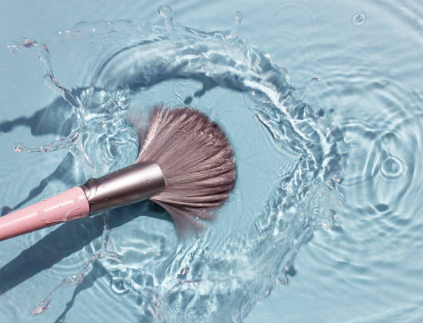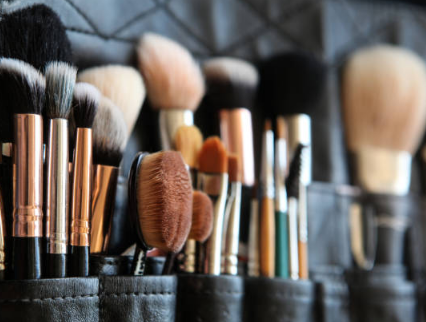Taking care of our skin is essential to prevent breakouts and irritation. While we can’t always control the changes that occur in our skin (hello, hormones), we can maintain the tools we use on our face and make sure they don’t exacerbate any problems.
Most people know the basic principles of keeping your fingers away from your face and disinfecting your phone screen regularly, but secret bacteria can hide in your products, especially makeup brushes, and harm your skin health. What follows will be an explanation of why it is important to wash your brushes and how often we should replace them, as well as other tips to help protect your skin. Keep scrolling for our comprehensive guide.

How Often Should You Change Your Makeup Brushes?
It is recommended to replace the makeup brush every two years. If they can’t be repaired because they aren’t washed often enough, and the bristles become stiff or feel greasy due to the buildup of too much product that can’t be washed off, it’s best to replace them immediately.
Makeup brushes are typically made up of both synthetic and non-synthetic hairs, depending on the manufacturer and type. If you keep your brushes clean and bacteria-free, they will last for a long time (especially if they are made from high-quality hairs like mink).
Why Do I Need to Clean My Makeup Brushes?
While it’s not anyone’s favorite chore, keeping your makeup brushes clean is essential for keeping your face in shape. Washing makeup brushes regularly can have some negative effects on your skin, and dirty brushes can build up makeup residue, oil, dead skin cells, and bacteria over time. When you reuse these brushes without washing them, you’re bringing these impurities back into your skin, causing clogged pores, breakouts, and irritation. Bacteria on the brush also promote the growth of harmful microorganisms, which can lead to infections or other skin problems.
What Happens if You Don’t Clean Your Brushes Regularly?
Bacteria on dirty makeup brushes can cause several common skin conditions, some of which include acne breakouts, folliculitis (inflammation of hair follicles), staph or streptococcal infections, and even fungal and/or yeast infections. These conditions cause redness, inflammation, and itching, and sometimes require medical treatment. More serious infections are theoretically possible, and all the more reason to make sure your makeup brushes are cleaned regularly. But thankfully, these cases are very rare.
If you do experience breakouts or clogged pores due to a dirty brush (which does happen), the solution is exfoliation. Regular but not over-exfoliation can help remove dead skin cells and unclog pores. Choose a gentle exfoliating product that doesn’t cause too much irritation to your skin, such as Resurface + Hydrating Serum ($88) from Matter of Fact. Chemical exfoliating products that contain “salicylic acid or glycolic acid are particularly effective in tackling breakouts.” Unfortunately, many people fall into the trap of exfoliating too often,[creating] a vicious cycle of irritation and disruption of the skin’s natural barrier maintenance process.

How Often Should You Wash Your Makeup Brushes?
Ideally, you should wash your brushes once a week, even if you only use them once. The American Academy of Dermatology recommends washing makeup brushes every 7-10 days.
How often you clean your makeup brushes depends on how often you use them and the type of product you use. As a general guideline, if you use your brush regularly, it is recommended to clean it at least once every two weeks. However, if you use them daily or have sensitive or acne-prone skin, it’s best to clean them once a week or even longer after each use. It is important to practice good hygiene to minimize the build-up of bacteria and product residue on the brush.
Keep Your Makeup Brush Clean
Now that we know the importance of cleaning makeup brushes, what are the best products to keep makeup brushes clean and help protect your skin’s health? If you look it up online, people will recommend a variety of products for cleaning makeup brushes, from Dawn dish soap to makeup brush cleaner. Facial cleansers can also be used. It cleanses your face, and you won’t react to it in any way. “This trick is very useful for people with sensitive skin, as different cleansers can sometimes cause adverse reactions.
Using a mild antibacterial soap or a specialized brush cleaner, gently swirl the bristles in the cleaner to lather. Be careful not to wet the area where the bristles come into contact with the handle, as it will weaken the glue that holds the bristles in place. Clean each brush and rinse in warm water until all residue has been washed off and the water runs clear. Place the brushes flat on a towel overnight, making sure they are completely dry before using them.
At Last
To avoid breakouts and unwanted skin irritation, wash your brushes regularly with a skin-safe cleanser. If you’re wondering if your brushes are up to standard, it’s best to replace them and maintain a consistent system to keep them clean.